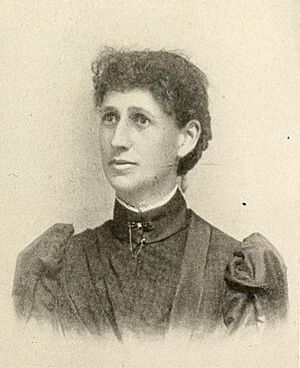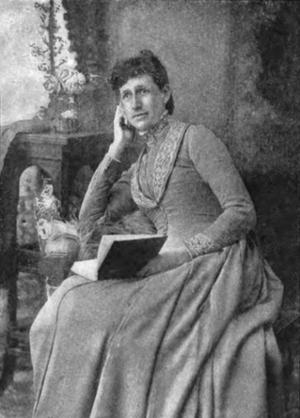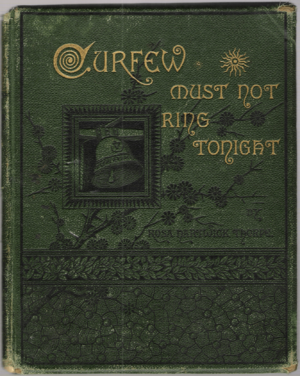Rose Hartwick Thorpe facts for kids
Quick facts for kids
Rose Hartwick Thorpe
|
|
|---|---|

"A Woman of the Century"
|
|
| Born | Rose Alnora Hartwick July 18, 1850 Mishawaka, Indiana, U.S. |
| Died | July 19, 1939 (aged 89) |
| Occupation | Poet, writer |
| Language | English |
| Notable works | Curfew Must Not Ring Tonight |
| Spouse | Edmund C. Thorpe |
Rose Hartwick Thorpe (born July 18, 1850 – died July 19, 1939) was an American poet and writer. She is best known for her famous poem, Curfew Must Not Ring Tonight, which she wrote in 1867. This poem became super popular and was translated into many languages around the world. People everywhere saw it as a true classic!
Rose also wrote other poems like "The Station Agent's Story," "Red Cross," and "In a Mining Town." She was a very busy writer. In 1888, she and her family moved to San Diego, California. She even gave San Diego's "False Bay" a new name, "Mission Bay", in a poem published in 1888. That name is still used today!
Contents
Rose's Early Life and School
Rose Alnora Hartwick was born in Mishawaka, Indiana, on July 18, 1850. Her parents were William Morris and Mary Louisa Hartwick. Her father's family were artists.
In 1861, her family moved to Hillsdale County. Rose grew up there and started writing when she was very young. She finished her schooling at Litchfield, Michigan High School in 1868.
Rose's Writing Career
Rose started her writing career while she was still in high school in Litchfield. She published a poem called "Curfew Must Not Ring Tonight" in a newspaper. It quickly became very popular across the country. This poem was based on an old story from the time of Oliver Cromwell. It was her first published work.
In 1871, Rose married Edmund Carson Thorpe. He was also a writer, known for his German dialect stories.
For many years, Rose wrote stories and poems for popular magazines and weekly papers. Her most famous shorter poems include "The Station Agent's Story" and "Remember the Alamo." She also wrote "In a Mining Town" and "Red Cross."
Rose wrote many books, especially stories for young people. Some of her published books are:
- Fred's Dark Days (1881)
- The Yule Log (1881)
- The Fenton Family (1884)
- Nina Bruce; or, A Girl's Influence (1886)
- Temperance Poems (1886)
- The Chester Girls (1887)
- Ringing Ballads (1887)
- The Year's Best Days (1888)
- Sweet Song Stories (1898)
The Year's Best Days, for Boys and Girls was a collection of stories and poems for young readers. It covered holidays like New Year's Day, St. Valentine's Day, April Fool's Day, Easter Day, Thanksgiving Day, Birthday, and Christmas. These fun stories for children also included poems and pictures. In 1882, a special illustrated version of "Curfew Must Not Ring To-night" was released. Many of her books had lots of pictures, some drawn by her daughter, Mrs. Lulo Thorpe Barnes.
In 1904, Rose Thorpe wrote about the White Lady Cave in San Diego-La Jolla Underwater Park in California. People visiting the cave could see the shape of a lady in the rocks. A local story said a bride was trapped there before she died. In her book The White Lady of La Jolla, Rose described the lady as "robed in shimmering garments of light, wrapped in a misty veil."
Rose's Community Involvement
Rose was a member of several groups. She belonged to the Pacific Coast Women's Press Association. She was also part of the Ladies' Literary Club in Grand Rapids, Michigan. She even started the Woman's Club of San Diego, California.
Later Life and Legacy
Rose Thorpe faced some health challenges for a few years. However, she felt better after moving to California. She passed away in San Diego on July 19, 1939.
In 1883, Hillsdale College in Michigan gave Rose an honorary degree. The college president said that her poem, "Curfew Must Not Ring Tonight," would make sure her name would always be remembered.
The town of Litchfield, Michigan, uses the poem's title as a symbol. Their fire trucks and city website show a bell that says "Curfew Shall Not Ring Tonight." There's also a bell in the center of Litchfield that honors the poem and Rose's time there.
As mentioned, Rose Thorpe named San Diego's "False Bay" as "Mission Bay" in a poem from 1888. That name is still used today.
Selected Works by Rose Thorpe
- 1887, Ringing ballads,: including Curfew must not ring tonight
- 188?, The yule log: a cluster of Christmas selections from holiday times
- 1881, Fred's dark days
- 1886, Nina Bruce ; or, A girl's influence
- 1887, Temperance poems
- 1887, The Chester girls
- 1888, The year's best days for boys and girls
- 1896, As others see us, or, The rules and customs of refined homes and polite society ... : also complete self instruction in physical culture for both ladies and gentlemen
- 1904, White lady of la jolla
 | Stephanie Wilson |
 | Charles Bolden |
 | Ronald McNair |
 | Frederick D. Gregory |



